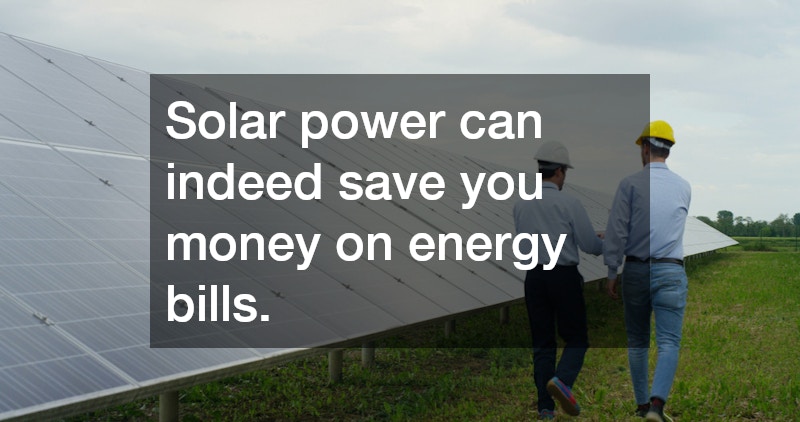In recent years, solar power has become an increasingly popular way for Australian households to reduce their energy costs and lower their environmental impact. With rising electricity prices and growing awareness of renewable energy, many homeowners are asking: can solar power really save you money on your energy bills? The short answer is yes, but there are a few important factors to consider before making the switch.
How Solar Power Works
Solar power systems use photovoltaic panels to convert sunlight into electricity. This energy can then be used to power your home appliances, lighting and heating.
Any excess electricity generated can often be exported back to the grid, allowing you to earn credits or payments from your energy retailer in a process called net metering.
The amount of money you save on your energy bills depends on how much solar electricity you generate and use. The more of your own solar power you consume, the less you need to buy from the grid.
Initial Investment vs Long-Term Savings
Installing solar power involves an upfront cost, including the purchase of panels, inverters and installation fees. The total cost can vary widely depending on system size and quality. While this initial expense might seem daunting, most systems pay for themselves over time through significant reductions in electricity bills.
According to the Australian Renewable Energy Agency (ARENA), the average payback period for residential solar power systems in Australia is around 4 to 6 years. After this period, the electricity generated essentially becomes free, leading to ongoing savings for the lifespan of the system, which can be 20 years or more.
Factors That Affect Your Savings
Several factors influence how much solar power can save you:
Location and Sunlight: Australia enjoys abundant sunshine, making solar power especially effective. However, regions with less sun might see smaller savings. South-facing roofs or shaded areas can reduce the system’s efficiency.
System Size: A larger system will generate more electricity but costs more upfront. Choosing the right size for your household’s energy needs is crucial for maximising savings.
Energy Usage Patterns: If you use most of your electricity during the day, when solar panels produce energy, you will save more. Conversely, heavy night-time electricity use reduces the immediate benefits of solar power.
Energy Retailer Policies: Feed-in tariffs, or payments for exporting solar energy to the grid, vary between states and retailers. Some offer better incentives than others, affecting overall savings.
Additional Ways Solar Power Can Cut Costs
Beyond lowering your electricity bills, solar power can offer other financial benefits. Some households pair solar with battery storage, allowing them to store excess energy generated during the day and use it at night. This reduces reliance on grid electricity even further, increasing savings.
Solar power systems can also increase your home’s value. Many buyers view solar panels as an attractive feature that lowers ongoing living costs, making your property more marketable.
Finally, using solar power contributes to environmental goals by reducing carbon emissions. This can provide peace of mind knowing you’re supporting cleaner energy solutions for the future.
Government Incentives and Rebates
To encourage adoption of renewable energy, the Australian government and some state governments offer various incentives for installing solar power. These can include rebates, interest-free loans, or grants that reduce the initial cost of installation.
For example, the Small-scale Renewable Energy Scheme (SRES) allows eligible households to receive Small-scale Technology Certificates (STCs), which can be traded to reduce the upfront cost of solar systems. It’s worth checking what incentives are currently available in your area to maximise your savings.
Maintenance Costs and System Lifespan
Solar power systems require minimal maintenance, mainly keeping the panels clean and ensuring inverters work correctly. Regular cleaning helps maintain efficiency, especially in dusty or polluted areas.
The panels themselves generally come with 20 to 25 years warranties, and modern inverters often last 10 to 15 years. Factoring in occasional replacement or repairs helps paint a realistic picture of the long-term costs.
Is Solar Power Right for You?
Deciding whether solar power will save you money depends on your specific circumstances. Consider your home’s orientation, roof condition and your energy consumption habits. Consulting with a qualified solar installer can help you understand your options and expected savings.
If you plan to stay in your home long-term, solar power is often a smart investment that pays dividends through lower bills and increased property value. Even if you only stay a few years, government incentives and the rising cost of grid electricity make solar power attractive for many Australian households.
Solar power can indeed save you money on energy bills, provided you choose the right system and understand your household’s needs. The combination of reduced electricity purchases, feed-in tariffs and government incentives makes solar power a financially sensible and environmentally friendly choice for many Australians.
With electricity prices expected to rise further, investing in solar power now can offer peace of mind and long-term savings. Plus, you’ll be doing your part to support a cleaner, more sustainable energy future.

